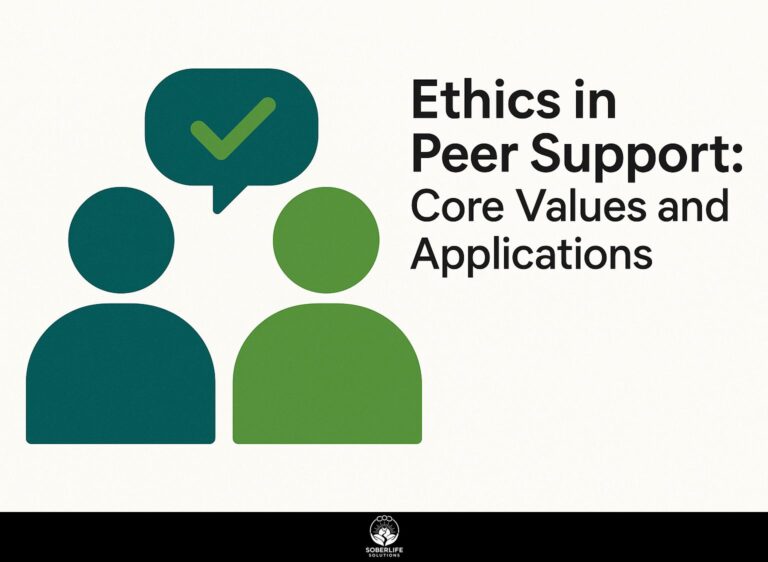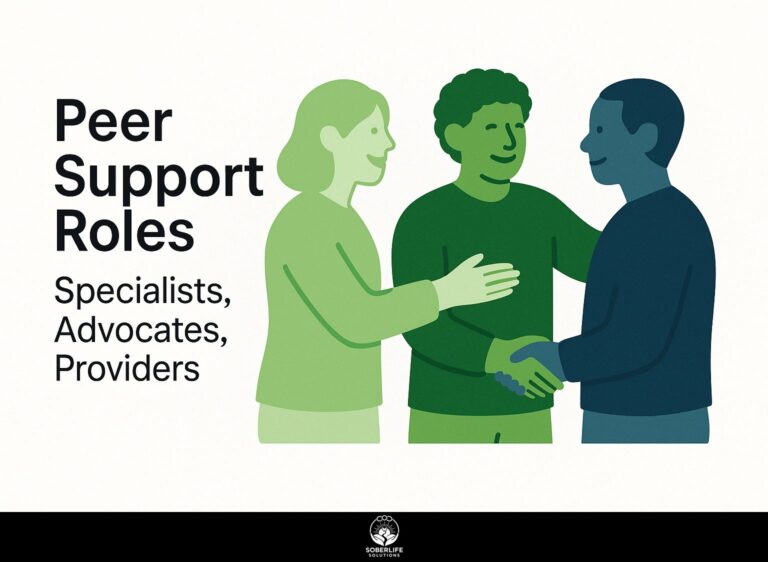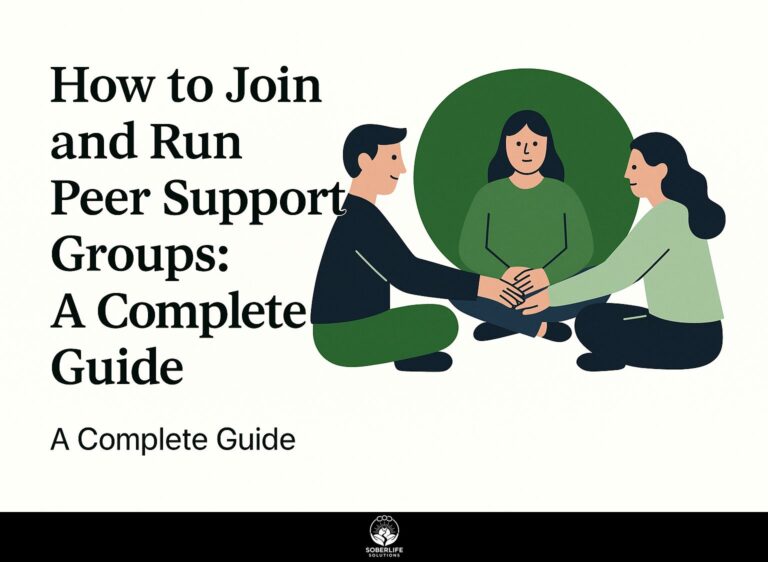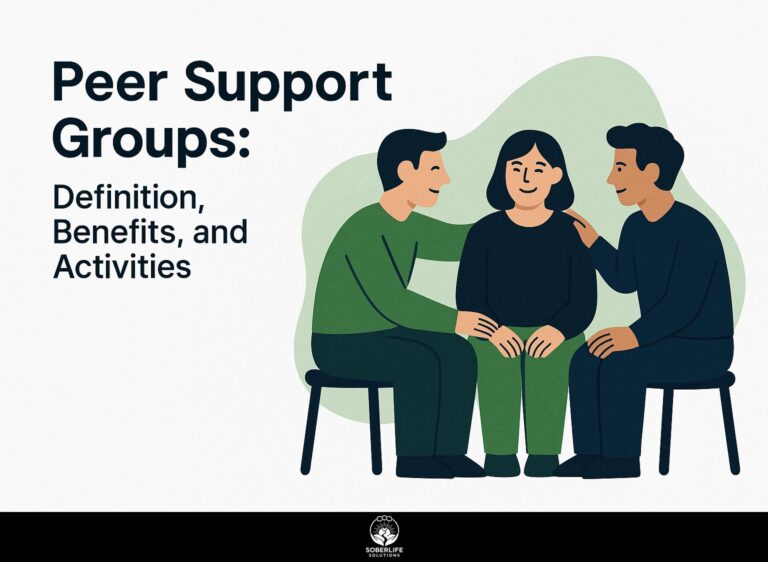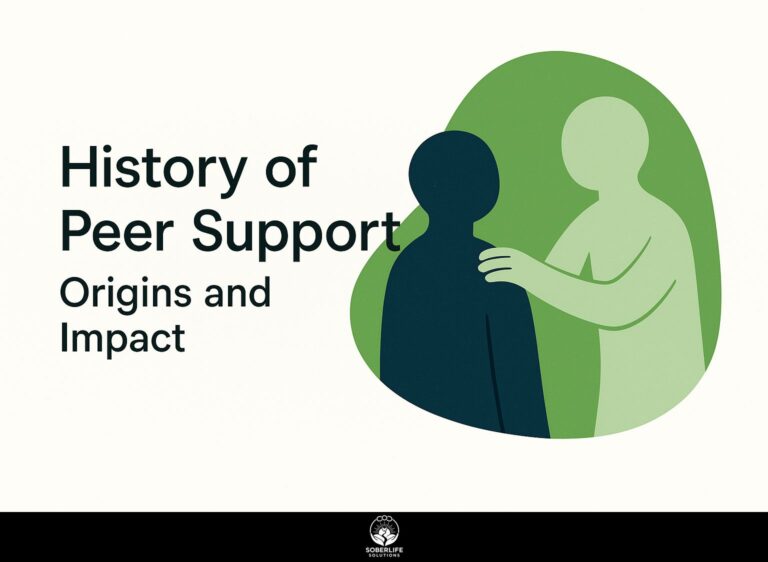Secular Organizations for Sobriety: Meetings and Benefits
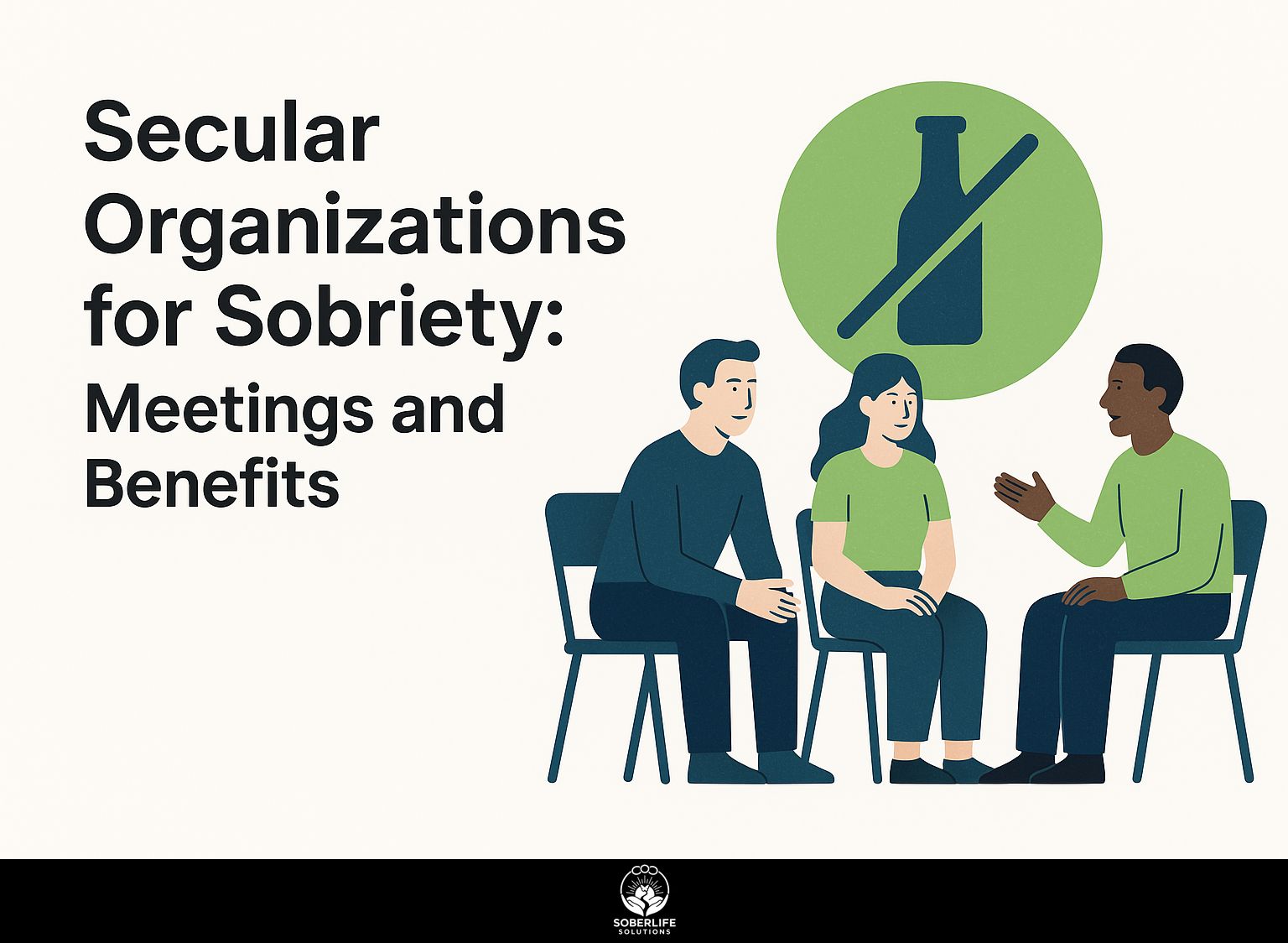
Looking for sobriety can be challenging, but Secular Organizations for Sobriety (SOS) provide a different option compared to traditional groups like Alcoholics Anonymous. SOS meetings offer a supportive environment to help individuals overcome addiction through effective techniques. Options like SMART Recovery offer different ways to achieve sobriety. In this article, we’ll look at different kinds of meetings you can attend, the advantages of participating in these non-religious groups, and ways to take part in your local community.
Key Takeaways:
Definition and Purpose
Secular Organizations for Sobriety provide a helpful group for people dealing with substance use problems, focusing on sensible choices and recovery techniques supported by research. In this context, Verywell Mind provides a detailed overview of non-religious alternatives to Alcoholics Anonymous, which can offer valuable insight for those seeking secular recovery options.
Groups such as SMART Recovery and LifeRing support individuals in their personal development and self-improvement, without incorporating religious aspects. For those exploring supportive environments, you might find this hidden gem on sober support systems particularly enlightening.
SMART Recovery follows a plan with four main steps that are:
- Building motivation
- Coping with urges
- Managing thoughts
- Leading a balanced life
In contrast, Alcoholics Anonymous often includes a spiritual element, which can be uncomfortable for some people. These groups create a welcoming space with non-religious meetings and resources. Members can talk about their experiences and ways to recover, showing that recovery is possible with personal decisions and help from others.
History and Development
The movement for secular sobriety began gaining traction in the 1980s, inspired by the need for non-religious alternatives to mainstream recovery programs. An example of this is LifeRing Secular Recovery, which offers another non-religious approach to recovery.
In 1985, James Christopher founded SMART Recovery, a support group that applies techniques from cognitive-behavioral therapy.
Following this, Women for Sobriety was established in 1975 by Jean Kirkpatrick, focusing on the unique needs of women in recovery.
Key milestones include:
- The first SMART Recovery meeting took place in 1994.
- The launch of their support materials in the late 1990s.
Both organizations focus on giving people control and responsibility for their own recovery. They offer organized programs that differ from usual religious-based recovery methods, echoing the broader secular recovery movement researched by LifeRing Secular Recovery.
Types of Meetings Offered
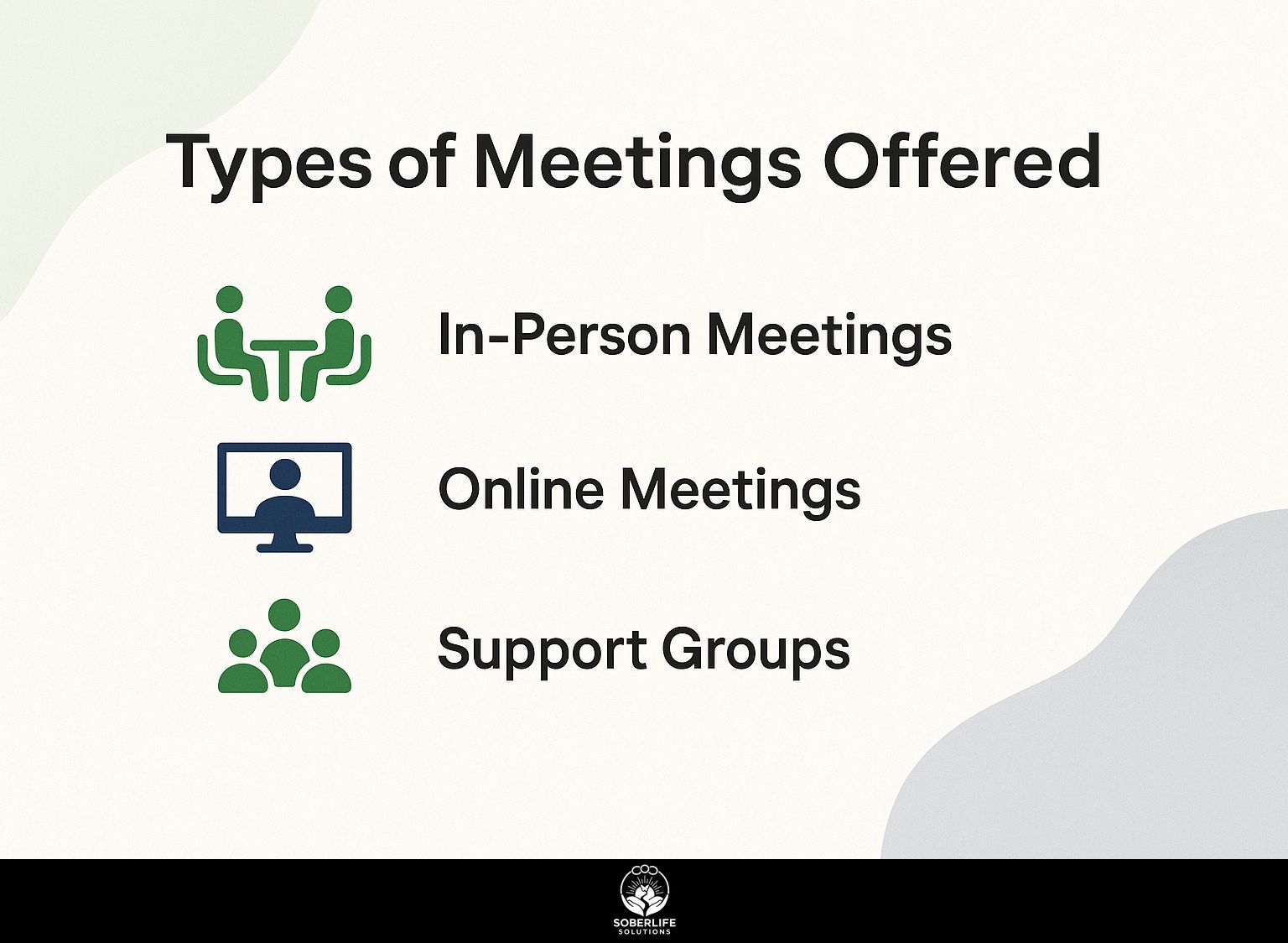
Secular Organizations for Sobriety offer different types of meetings to meet different needs, ensuring support is available and useful for all. To enhance your sobriety journey, explore how various sober support systems can provide vital assistance tailored to your specific circumstances.
In-Person Meetings
In-person meetings give people a place to talk about their experiences and encourage emotional growth in a friendly group setting.
These meetings typically include structured activities such as sharing personal stories, guided discussions, and facilitated exercises that encourage reflection.
Groups need to set clear rules for joining so that all members feel safe and respected. For instance, participants might agree to practice active listening, maintain confidentiality, and respect differing viewpoints.
This team environment improves relationships and strengthens the common goal of growth and help among members.
Online Meetings
Online meetings have become increasingly popular, offering flexible access to recovery support for individuals unable to attend in-person gatherings.
These virtual platforms, like Zoom, Google Meet, or Microsoft Teams, provide anonymity, allowing participants to share their experiences without revealing personal details.
They enable accessibility for people in remote areas, thereby connecting a global community of individuals. For instance, a person in a rural setting can join a recovery group based in a metropolitan city, broadening their support network. This global reach is particularly highlighted by Psychology Today, which discusses the substantial benefits and potential downsides of such virtual settings. For those interested in broadening their participation, learn more about how to find and access online A.A. meetings globally.
Several platforms provide breakout sessions where smaller groups can talk, helping people connect and feel part of a community.
Support Groups
Support groups in non-religious organizations focus on peer support, offering a safe place for people to talk about their recovery experiences and share ways of managing challenges.
These groups often adopt diverse formats to accommodate varying recovery philosophies.
Meetings that focus on discussion help members freely share their experiences, creating a feeling of togetherness. Alternatively, structured formats, like the 12-step model, provide a more guided approach, emphasizing incremental progress.
Online forums can also serve as effective platforms for those who may feel intimidated in face-to-face settings. No matter the setup, the main purpose stays the same: to help people by sharing knowledge and support, emphasizing how important it is to connect with others during recovery.
Benefits of Joining Secular Organizations
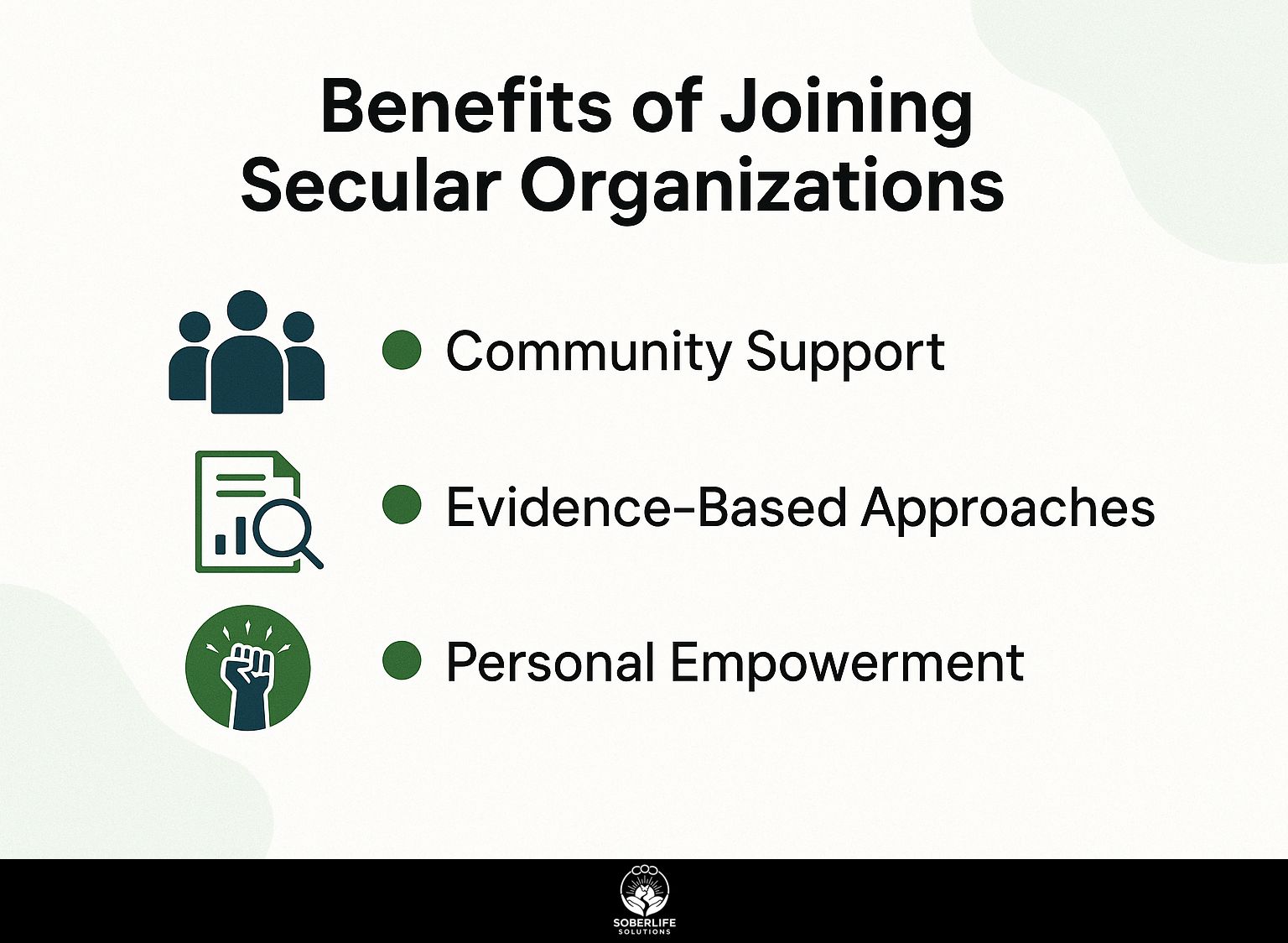
Being part of a secular sobriety group offers benefits like meeting other people, using effective strategies, and concentrating on self-improvement.
Community Support
Secular groups help people feel part of a community, creating connections among individuals. They encourage helping each other and sharing experiences during recovery.
Groups like SMART Recovery and Recovery International provide structured environments for people to share their stories and find ways to handle difficulties.
SMART Recovery helps you take charge of your behavior by using the ‘4-Point Program’ to manage your thoughts and actions. Statistics show that individuals who engage regularly in such groups are 50% more likely to maintain long-term sobriety compared to those who don’t.
Personal success stories often show how these relationships give both emotional support and practical help during difficult times.
Evidence-Based Approaches
Many secular organizations use evidence-based methods like cognitive-behavioral therapy, which have been shown to be effective in supporting long-term recovery.
These organizations often use methods like mindfulness training and motivational interviewing to improve their therapy approaches.
Mindfulness exercises can reduce anxiety and improve control over emotions, which is important during recovery. A study published in the Journal of Substance Abuse Treatment found that participants who engaged in mindfulness techniques reported lower relapse rates.
Motivational interviewing can help strengthen dedication to change, making it a useful way to reduce resistance. These methods work together to form a complete support system customized to each person’s needs.
Personal Empowerment
Secular organizations focus on helping people gain personal strength, motivating members to manage their own recovery process and make thoughtful choices about their lives.
These organizations often offer workshops focusing on topics like life skills, stress management, and peer support.
For example, SMART Recovery provides meetings where individuals can share their experiences and learn practical methods for solving problems. Literature such as workbooks and self-help guides reinforces these lessons, allowing members to engage at their own pace.
Many participants say that these resources give them confidence and help them make important life changes, which in the end, supports them in staying sober for a long time and feeling more control over their life.
How to Get Involved
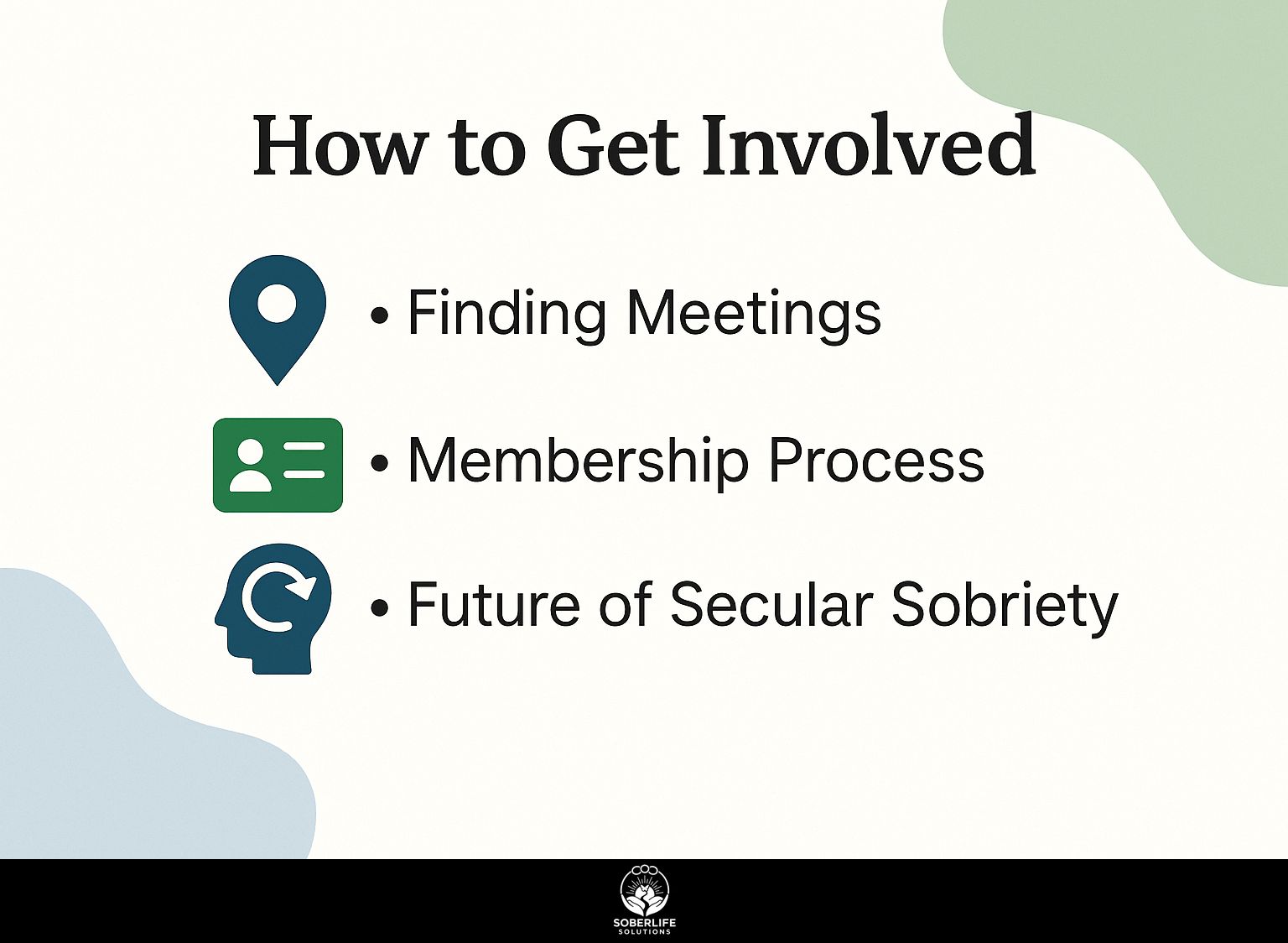
Joining a secular organization is easy, with many ways for people to find help and support as they work on their recovery.
Finding Meetings
Websites such as MeetingFinder and the SMART Recovery site assist people in locating local or online meetings.
To make the most of your search, use social media sites like Facebook and Twitter. Join groups or follow hashtags related to your interests, which often post about upcoming meetings.
Websites like Meetup or Eventbrite are great places to find local events.
For a more organized approach, consider using apps like GroupMe, where local events are frequently shared. By using these tools together, you can keep updated and involved with different meetings customized for what you need.
Membership Process
The membership process for secular organizations varies but often requires a commitment to attend meetings and participate in the recovery community.
Typically, interested individuals must complete an initial assessment, which helps identify their specific needs and goals.
Following this assessment, they are encouraged to attend regular meetings, often held weekly, and engage in various community activities. Interacting with other members helps build support and responsibility, which are important for personal development.
Some organizations might recommend attending workshops or retreats to help people better grasp and commit to the process. Ongoing participation is important for creating strong connections and developing a helpful network.
Future of Secular Sobriety
As trends in addiction services evolve, secular organizations are likely to expand their reach and influence, providing innovative solutions to recovery challenges.
Emerging trends indicate a growing integration of technology, such as teletherapy, which offers clients flexible access to support.
For instance, platforms like BetterHelp facilitate virtual counseling, catering to different needs. Community engagement is growing through user-driven forums and support groups on social media, encouraging peer connection and shared experiences.
Research shows that methodologies like Motivational Interviewing (MI) are enhancing retention in treatment programs, as they focus on individual readiness to change.
These updates are altering the way non-religious recovery groups manage addiction, making them more accessible and effective.
Frequently Asked Questions
What is Secular Organizations for Sobriety (SOS)?
Secular Organizations for Sobriety (SOS) is a non-profit network of autonomous, non-professional, non-religious mutual support groups for individuals struggling with addiction.
Are SOS meetings open to everyone?
SOS meetings welcome anyone looking for help with their addiction, no matter their beliefs or if they have none. The only requirement for attendance is a desire to stop using alcohol or drugs.
What can I expect at an SOS meeting?
SOS meetings typically involve group discussions and mutual support among members. There are no prescribed steps or rituals, and all members are encouraged to share their personal experiences and offer support to others.
How are SOS meetings different from other 12-step programs?
SOS meetings do not use the 12-step approach or any religious or spiritual elements. They focus on giving people the tools to manage their own recovery through self-help and working together, instead of depending on a higher power.
Are there any benefits to attending SOS meetings?
Attending SOS meetings can provide a sense of community and support, as well as practical tools and strategies for managing addiction. It can be a secure and supportive place for people to share their problems and get support and motivation from others.
How can I find an SOS meeting near me?
The SOS website has a searchable database of meetings around the world. You can also contact the national office for help in finding a meeting near you.

